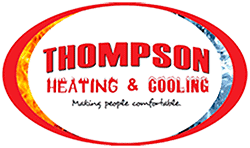The average person spends around 90% of their time indoors, so it’s crucial to ensure that the air quality within our homes is clean and healthy. Poor indoor air quality can lead to many health issues, such as allergies, respiratory problems, and chronic headaches. Furthermore, it can also impact your home’s overall comfort level and impact your HVAC system’s efficiency.
At Thompson Heating & Cooling, we have been serving residents of La Grange, Louisville, and the surrounding areas since 2003, providing quality whole-home comfort services, including solutions to improve indoor air quality.
Your home’s indoor air quality can be affected by many factors, such as the presence of allergens, pollutants, humidity levels, and even the efficiency of your heating and cooling system. Proper maintenance and understanding of these factors can help you create a healthier, more comfortable living environment for you and your family.
In this extensive guide, we will explore the importance of indoor air quality and discuss various solutions to help you maintain optimal air quality in your home. The guide will cover the following topics:
- The Importance of Indoor Air Quality: Gain a better understanding of how indoor air quality impacts your health, comfort, and overall well-being.
- Common Indoor Air Pollutants: Learn about the most common pollutants and allergens that contaminate the air within your home, such as dust, pollen, pet dander, and volatile organic compounds (VOCs).
- HVAC System’s Role in Air Quality: Discover how your heating and cooling system, when properly maintained, can contribute to better indoor air quality by filtering out pollutants and regulating humidity levels.
- Air Quality Solutions: Explore various solutions and technologies that can help improve your home’s indoor air quality, such as air filters, air purifiers, humidifiers, and proper ventilation.
- Preventative Measures for Improved Air Quality: Learn the steps you can take to prevent indoor air pollution and maintain a clean, healthy living environment in your home.
At Thompson Heating & Cooling, our goal is to provide you with the most effective solutions to create a healthy, comfortable, and energy-efficient home. This guide will equip you with the knowledge and understanding you need to make informed decisions about your home’s indoor air quality and the technologies and practices that can positively impact the air you breathe daily.
Indoor Air Quality: Health, Comfort & Solutions for Optimal Air Quality in Your Home
The Importance of Indoor Air Quality
Indoor air quality (IAQ) encompasses the condition of the air within our homes, offices, and other interior spaces. Improving IAQ should be a priority for homeowners, as it plays a vital role in maintaining good health and overall well-being.
Research suggests that poor IAQ can contribute to a variety of health issues, including respiratory problems, allergies, and fatigue. Furthermore, maintaining good air quality can enhance your home’s comfort levels, ensuring that you and your family enjoy an optimal living environment.
Common Indoor Air Pollutants
Several common pollutants can contaminate your indoor air. Understanding these pollutants and their sources can help you take preventative measures to improve the air quality in your home. Some of the most common indoor air pollutants include:
- Dust and pollen: Dust accumulation can occur from various sources, such as human skin cells, pet dander, and outdoor pollutants. Pollen from plants can enter your home through open windows and doors or by attaching to clothing and shoes.
- Pet dander: For pet owners, dander is almost inevitable, but it can be a significant source of allergens that affect indoor air quality.
- Mold and mildew: Excessive moisture in your home can foster the growth of mold and mildew, which release spores into the air and aggravate allergies and respiratory issues.
- Volatile Organic Compounds (VOCs): VOCs are gases released from various household products, such as cleaning supplies, paint, and even new furniture. These compounds can irritate the eyes, nose, and throat, as well as cause headaches and nausea.
HVAC System’s Role in Air Quality
Your heating, ventilation, and air conditioning (HVAC) system plays a crucial role in maintaining good indoor air quality. When properly maintained, your HVAC system can help filter out pollutants, allergens, and particulate matter from your indoor environment. Additionally, a well-functioning HVAC system can regulate humidity levels in your home, preventing the growth of mold and mildew and ensuring a comfortable atmosphere.
To ensure that your HVAC system contributes positively to your air quality:
– Regularly replace air filters: Clean air filters can effectively capture dust, pollen, and other contaminants. Replace your filters at least every 1-3 months, depending on usage and the specific type of filter.
– Schedule annual professional maintenance: Regular maintenance performed by a trusted HVAC technician, such as those at Thompson Heating & Cooling, can ensure that your system runs optimally and contributes to a healthier indoor environment.
– Properly ventilate your home: Ensure that your home is well-ventilated to allow fresh outdoor air to circulate and dilute indoor pollutants.
Air Quality Solutions
There are several solutions and technologies available to help improve your home’s indoor air quality:
- Air filters: Using high-quality air filters, such as those with a high Minimum Efficiency Reporting Value (MERV) rating, can effectively capture particulate matter and allergens from the air.
- Air purifiers: These devices work to actively remove pollutants from your indoor environment. Many air purifiers use HEPA (High-Efficiency Particulate Air) filters, which can capture up to 99.97% of airborne particles as small as 0.3 microns.
- Humidifiers and dehumidifiers: Maintaining ideal humidity levels in your home (between 30-50%) can inhibit the growth of mold and mildew while preventing dry air issues. Consider using a humidifier or dehumidifier to help regulate your home’s humidity as needed.
- Proper ventilation: Installing exhaust fans in rooms with high moisture levels, such as bathrooms and kitchens, can help maintain healthy indoor air quality by minimizing mold and mildew growth.
Preventative Measures for Improved Air Quality
Taking proactive steps to prevent indoor air pollution can be highly effective in maintaining a clean, healthy living environment:
– Keep your home clean: Regular cleaning, vacuuming, and dusting can significantly reduce the accumulation of dust, pollen, and pet dander.
– Change bedding regularly: Wash bed linens and pillowcases frequently to minimize the buildup of allergens.
– Use low-VOC products: Reduce your exposure to VOCs by opting for low-VOC or VOC-free household products, such as cleaning supplies and paint.
– Address water leaks promptly: Fix any water leaks or damage to prevent mold and mildew growth.
– Implement a no-smoking policy: Prohibiting smoking indoors is essential to maintaining good indoor air quality.
Conclusion
Improving your home’s indoor air quality is essential for promoting good health, comfort, and overall well-being. Understanding the common pollutants and their sources, maintaining your HVAC system, and implementing effective air quality solutions and preventative measures can create a healthier, cleaner, and more enjoyable living environment.
Trust Thompson Heating & Cooling to provide you with the products and services necessary to achieve optimal indoor air quality for you and your family. Contact us today to learn more about our HVAC service in Louisville, KY.





